- Home
- Anne Bishop
Vision in Silver Page 6
Vision in Silver Read online
Page 6
“You want us to buy those houses?” Tess asked.
“Yes,” Simon replied. “A place for Wolf lovers to live.”
“Those houses aren’t part of the Courtyard,” Elliot pointed out. “We’ll have to pay taxes on them, as well as the rest of the expenses, just like humans do.”
He nodded. “And we will control who lives in those dens, just as we will decide who will live in the houses in the River Road Community and who will receive the raw materials needed to make things useful to us as well as humans.”
No one had anything more to say about gardens or houses. After giving Henry a questioning look, no one had any ideas about a brown bear eating jewels.
“Are we done?” Simon waited for everyone to nod. “In that case, I think I should go to the Chestnut Street station and talk to Captain Burke and Lieutenant Montgomery.” And while he waited for Blair to bring over a vehicle from the Utilities Complex, he could find out what Meg and her pack were doing with the camera.
No one lingered to talk except Elliot.
“If we buy those houses, it will cause trouble here,” Elliot said, handing the index cards to Simon.
“There’s already trouble here,” Simon replied. “The mayor aligning himself with the HFL movement is proof of that. We just need to do whatever we can to protect ourselves so that if the Lakeside humans turn on us, the terra indigene and our humans in the Courtyard will have a way to survive.”
Pater,
The trial runs for the pharmaceutical enhancements showed great potential, and I think the enhancements could be of significant value to the last stage of HFL’s plans. Unfortunately, the manufacturer went out of business unexpectedly, and it is unlikely in this current climate that other possible manufacturers will be willing to take the risk of providing the product, despite significant monetary rewards. However, from what I understand, the final product is easy to produce if one has quality materials. Therefore, I will discreetly send a sample of the raw material on the next ship traveling to Cel-Romano. I also recommend exploring some of the country villages in our homeland, since they would be the most likely places to have what we seek. And having a local source, even if the material is of inferior quality, will reduce the amount we would need to export from Thaisia.
—NS
CHAPTER 5
Thaisday, Maius 10
The girl stumbled along the side of the road, looking for something, anything, she recognized from the binders filled with training images.
Highway. Two lanes, a wide strip of grass called a median, and two more lanes with cars going in the opposite direction.
Here, the keepers had said. This medicine will make you feel good.
It had made her feel good; almost as good as the euphoria. She and the other girls had floated while being packed into a horse trailer. They’d stopped and started many times during the night, and each time they stopped, a girl was left by the side of the road.
The farm is closed, the keepers said when some of the girls cried and begged to go back. Can’t afford to keep you anymore.
She’d seen something or heard something when they made the last cut, something she needed to remember. So important to remember. But she was so big and so tired and so alone out here. She’d never been alone except in her cell, and that didn’t feel like being alone because she knew there were girls in the other cells all around her and the keepers were always present and always checking on her.
No one here now.
Too many images, too many sounds. They beat at her—fists made of images and sounds. Belly too big, too awkward. Hurting. She tried to tell them about the hurting when they led her from the trailer, but the keepers didn’t listen.
The farm is closed. You have to go. Then the keepers said the last, and most frightening, thing. If the Others find you, they’ll kill you and the baby. They’ll tear open your belly and eat the baby right out of you.
Needed to find people, find the farm, find . . . something.
Police? No. Police wouldn’t help the girls at the farm. That’s why the place was a secret. When girls were taken away by the police, they were beaten so they would lose the babies. The keepers said so.
She stumbled on the gravel that made up the shoulder on this side of the highway. Taking awkward steps to avoid falling, she ended up in the right-hand lane. She saw the big truck approaching and took a step toward the shoulder.
Images of people and highways crowded her mind. Images of animals and highways crowded her mind. A word under the images of dead animals: roadkill.
She would stand on the shoulder of the highway and wave. Maybe the people in the truck would stop. Maybe they would give her a ride and take her back to the farm. Her belly hurt more and more. Rhythmic hurting. She needed to get back to the farm because rhythmic hurting meant something.
A blast from the truck’s horn scared her. Had to move out of the way, had to . . .
She heard howling. Terrible howling.
The Others were coming! They would find her and . . .
She ran straight into the path of the truck. As it hit her, she remembered that something from the last prophecy—the woman’s voice saying, “Don’t! It’s not too late!”
And then it was too late.
CHAPTER 6
Thaisday, Maius 10
Lieutenant Crispin James Montgomery extended his hand to the man who rose from the visitor’s chair as Captain Burke made the introductions.
“I’m pleased to meet you, Mr. Denby,” Monty said, shaking Pete’s hand. “I’m glad you and your family made it to Lakeside all right.”
“So am I. I don’t think we would have made it without the terra indigene’s help,” Pete said.
Pete Denby had assisted in the search for the Controller. When that assistance made him a target, he packed up his wife and two children and headed for Lakeside—a long drive from the Midwest Region of Thaisia. Their car was run off the road, a deliberate attempt to injure or kill Pete, but the Others intervened and provided an escort for the rest of the trip.
“Are you planning to go back to the Midwest?” Monty asked.
Pete’s eyes held a bleak look before he gave Monty a too-hearty smile. “Don’t think I have much future there.” The too-hearty smile slipped. “Not sure I have much of a future here either.”
“I already told you,” Burke said. “I don’t have a current tenant for the other side of the duplex, and you’re welcome to use it.”
“I appreciate that,” Pete said. “But a roof over our heads is only half the problem.”
“Problem?” Monty looked from one man to the other.
“We’ll work it out,” Burke said.
“Even you can’t continue feeding four extra people on a single ration book,” Pete said tightly.
“If you’re going to relocate—,” Monty began.
“In order to receive a ration book that can be used in Lakeside, one or more adults in the family need to be employed—and show proof of that employment,” Pete said. “Apparently there is some fear that a glut of people coming in from other towns will try to get ration books without being part of the working population, which will create food shortages. If there are shortages, prices will go up and more people will end up with less.”
“You went to two interviews since you decided to look for work here,” Burke pointed out. “You turned down both offers.”
“I’m not signing some damn ‘loyalty pledge,’” Pete snapped. “Especially when the senior partners in the law firm turned evasive when I asked to whom or what I was supposed to pledge my loyalty.”
Monty’s stomach did a queasy roll. “Humans First and Last?”
“I think so. Have you heard the motivational speaker Nicholas Scratch?”
Monty caught the glance Burke directed at him. Yes, he’d heard, and heard of, Nicholas Scratch. The man came from the Cel-Rom
ano Alliance of Nations, but Scratch was currently living in Toland with Monty’s ex-lover and young daughter.
“I heard a couple of his recent speeches, and he’s a persuasive bastard,” Pete continued. “If I wasn’t almost one hundred percent certain that the HFL were behind the threats to my family, I’d be more than halfway to believing they had the answer to anything and everything. Want your children to have more milk? Kill a Wolf.”
“Pete,” Burke began, looking toward the doorway of his office.
“It’s not our fault that, as a species, you’re pretty stupid.”
Monty winced, then turned to face Simon Wolfgard as the Wolf stepped into Burke’s office.
“I think we’ve shown we can be dangerous,” Pete said.
“Being dangerous doesn’t make you less stupid,” Simon replied. “And being clever about inventing and making things isn’t the same as being smart about the world. Sometimes there isn’t enough food. Sometimes pups don’t survive the starving time. When that happens, we don’t like it either. We work hard to bring down meat for our packs and to feed our young, and we don’t like it when another predator tries to take our kills.”
“I don’t think we understand your point, Mr. Wolfgard,” Burke said.
Monty heard the emphasis on Simon’s name and saw Pete turn pale as he realized he’d been overheard by a Wolf.
Simon stared at Pete, anger creating flickers of red in the amber Wolf eyes. “We will fight for what is ours. In the end, your young will have enough to eat because there will be fewer humans wanting a share. And our young will grow strong on all the meat harvested from the fight.”
A tense silence filled the room. Then Pete said, “You’re big on destruction.”
“We adapt to the world, and we learn from other predators. That includes humans.”
Monty caught Burke’s eye and understood the message. “Mr. Wolfgard, perhaps you and I can continue this conversation elsewhere.”
Simon scrubbed his dark hair with both hands. If he’d been in Wolf form, he’d probably give his whole body a good shake. What Monty found intriguing was how that action seemed to shake off the anger as well. A moment ago, Simon couldn’t have passed for human. Now he looked like a handsome, active man in his mid-thirties who was dressed in the casual attire suitable for a bookstore owner. Now the amber eyes were the only clue that you were looking at a terra indigene Wolf.
“No. If he’s the male the terra indigene helped to reach Lakeside, then it’s him I came to see.” Simon tipped his head toward Pete. Then he looked at Burke and Monty.
“And I came to see you about something else.”
Pete stared at the Wolf. “You came to see me? Why?”
“To ask if you are willing to do a small job for the Courtyard.”
Monty held his breath. He’d spent the past four and a half months building some trust between himself and Simon Wolfgard. His team interacted with Courtyard residents almost daily in an unofficial capacity, learning more about the Others than most humans were ever allowed to see—and providing examples of humans who peacefully interact with what lived in the Courtyard. All that work might be damaged by a man who had some reason to be resentful since his life had spun out of control because of assisting the terra indigene, even if it was indirectly.
But Pete Denby surprised him by saying, “What kind of job? Do you need a lawyer?”
“Not yet,” Simon replied thoughtfully. “Two buildings across the street from the Courtyard are for sale. We want someone to look at them and tell us if they are suitable dens. If we buy them, we will need to hire a human who can settle the legal papers.”
“Some of the terra indigene are going to live outside the Courtyard?” Monty asked. Simon Wolfgard was a progressive leader. He’d opened some stores to the general public and had more human employees than any other Courtyard on the continent. But he wondered if the Wolf wasn’t being a bit too progressive right now.
“No,” Simon said. “We’ll offer them to humans who are being driven out of their dens because they choose to work with us or for us. Like Kowalski and Ruthie.”
Douglas Burke was a big man whose blue eyes usually held a fierce kind of friendliness. But the look in those eyes as he rose from his chair behind the desk was fierce enough to make Simon growl in response.
“Excuse me?” Burke said.
Simon stopped growling and looked at all of them. “Kowalski didn’t tell you?”
“I haven’t heard about this,” Burke said with enough anger that Monty felt the heat of it. “What about you, Lieutenant?”
“No,” Monty replied. “I knew something was bothering him. I figured he would talk to me when he was ready.”
“Why not ask Kowalski to take a look if he’s the one who might be living there?” Pete asked.
“The humans who live there now would know his face,” Simon said. “We want someone to look before the humans realize the Courtyard wants to buy the buildings.”
“I’ll charge my usual hourly rate,” Pete said. “You’ll get a written report about each building. All right if I bring my wife? She’s the handyman in our family.”
Simon cocked his head. “Your wife is male?”
Pete blinked. “No. I just meant she’s the one who likes working with tools and doing repairs.”
“Do you have someone to watch the children?” Burke asked.
“We can watch the puppies,” Simon said.
Leap of faith, Monty thought, watching Pete struggle with the thought of handing his children over to Wolves . . . and whatever else might become curious about small humans.
“All right. Thanks,” Pete said. “Is tomorrow soon enough?”
Simon nodded as he pulled a folded piece of paper out of his jeans pocket. “This is the phone number for Howling Good Reads. Call there when you’re ready to look at the houses. Here are the addresses on Crowfield Avenue and the phone number on the For Sale signs.”
“I’ll set up an appointment with the property agent, and Eve and I will see you tomorrow.”
Monty wondered if Simon was waiting for Pete to leave before telling them about the other thing that had brought a Wolf to a police station. There were aspects of the Courtyard the Others didn’t share lightly. On the other hand, if Pete was going to do some house hunting for them, he was bound to meet the Courtyard’s carefully guarded and special employee.
Simon studied Pete for a moment, then turned to Burke. “Have the police been told to search for girls left on the side of the road?”
“Any particular kind of girl?” Burke asked quietly.
“Girls with silver razors. Girls who are gestating.” Simon growled. “Roadkill.”
Burke’s eyes looked like blue ice. “Here in Lakeside?”
Simon shook his head. “Beyond Lakeside and Great Island.”
“How . . . accurate . . . is your information?”
“We sent out a warning to all the terra indigene in Thaisia because of what we were told. They’re already searching. You’re the last pack to hear the warning.”
“We’ll get the word out. Lieutenant?”
Monty looked at Simon and motioned toward the door. “I’ll walk you out.”
“My scent here is fresh. I can find the door to outside.” Simon cocked his head. “This walking. It’s like a female in a story saying she’s going to powder her nose when she’s really going to pee?”
Pete choked.
“Something like that,” Monty said in a strangled voice. He walked out of Burke’s office. Simon followed him.
Monty waited until they were outside. “Is Ms. Corbyn all right? That’s how you know the information is accurate, because she made a cut?”
“Meg is fine—but she doesn’t know about the girls yet.” Simon shifted his weight from one foot to the other, a small sign of anxiety in someone who was usua
lly bold and direct. “Humans paid a lot of money for prophecies. That makes the cassandra sangue valuable to the humans who run the compounds. Why would they leave girls on the side of the road?”
“The girls could have left on their own. Meg did.”
“Meg escaped. These girls can tell police, can tell us they want to leave. They didn’t have to run away and be alone.” Simon’s eyes were full of sadness and acceptance in equal parts. “We won’t find some of them until they’re dead.”
“The police will be out there searching too, and we’ll save as many as we can.” Monty waited a beat. “Anything else?”
“Nothing that can’t wait.” Simon walked away.
While Monty watched Simon and Blair drive off, Louis Gresh, commander of the bomb squad, approached.
“You look like you’ve just found a ticking briefcase,” Louis said.
“Close enough. But thank the gods, the bomb isn’t in Lakeside this time.”
“Anything I can do to help?”
“Plenty.” Together, they went back inside to help Burke send the warning to police stations throughout Thaisia.
CHAPTER 7
Thaisday, Maius 10
He looks sad, Meg thought as Simon walked into the sorting room and stopped when he realized Merri Lee and Ruth were with her. He looks angry and sad.
She rushed toward him. “What happened?” When he didn’t answer, she looked at her friends, then back at him. “Simon? What happened?”
What were you supposed to do when a friend looked angry and sad but you didn’t know why?
“You’re the Trailblazer,” Simon said. “You have answers, and we need answers.”
“He’s right,” Merri Lee said.
Meg compared Merri Lee’s face to training images. Pale. Sick. Upset.

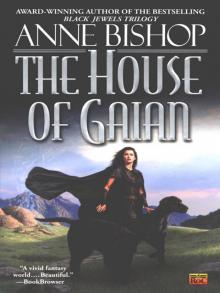 The House of Gaian
The House of Gaian Heir to the Shadows
Heir to the Shadows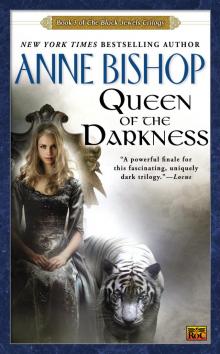 Queen of the Darkness
Queen of the Darkness Shaladors Lady
Shaladors Lady Written in Red
Written in Red Lake Silence
Lake Silence The Voice
The Voice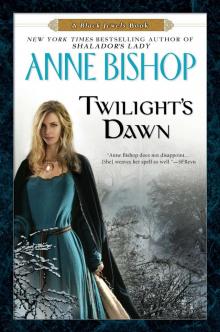 Twilights Dawn
Twilights Dawn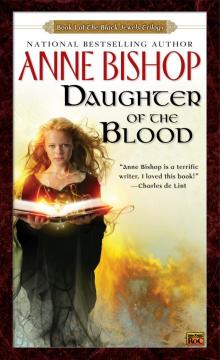 Daughter of the Blood
Daughter of the Blood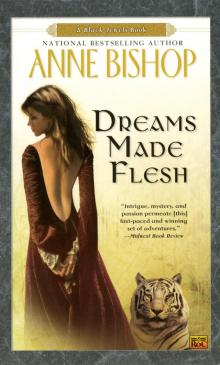 Dreams Made Flesh
Dreams Made Flesh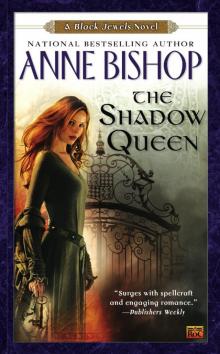 The Shadow Queen
The Shadow Queen Etched in Bone
Etched in Bone Wild Country
Wild Country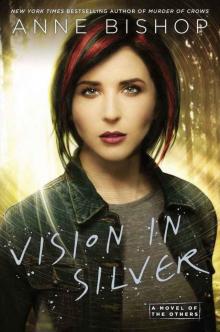 Vision in Silver
Vision in Silver Sebastian
Sebastian Shadows and Light
Shadows and Light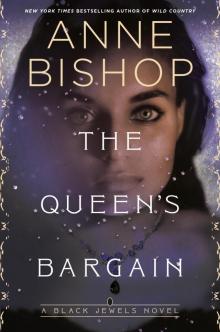 The Queen's Bargain
The Queen's Bargain Bridge of Dreams
Bridge of Dreams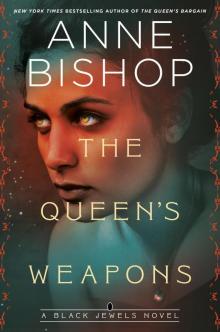 The Queen's Weapons
The Queen's Weapons Pillars of the World
Pillars of the World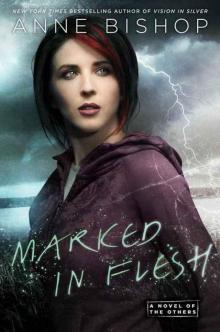 Marked in Flesh
Marked in Flesh Heir to the Shadows dj-2
Heir to the Shadows dj-2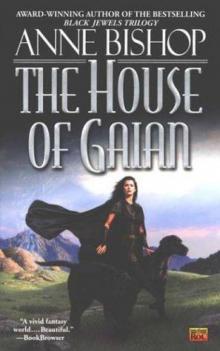 The House of Gaian ta-3
The House of Gaian ta-3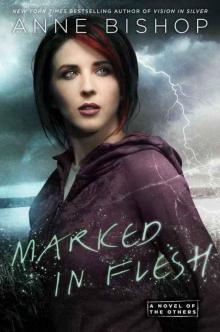 Marked In Flesh (The Others #4)
Marked In Flesh (The Others #4)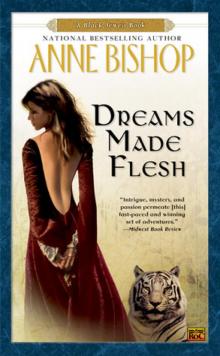 Dreams Made Flesh bj-5
Dreams Made Flesh bj-5 Written In Red: A Novel of the Others
Written In Red: A Novel of the Others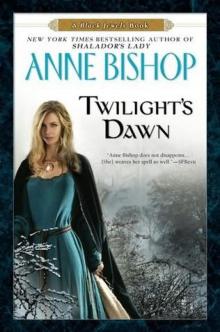 Twilight's Dawn dj-9
Twilight's Dawn dj-9 Shalador's Lady bj-8
Shalador's Lady bj-8 The Pillars of the World
The Pillars of the World Bridge of Dreams e-3
Bridge of Dreams e-3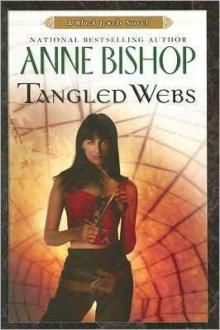 Tangled Webs bj-6
Tangled Webs bj-6 Murder of Crows: A Novel of the Others
Murder of Crows: A Novel of the Others Sebastian e-1
Sebastian e-1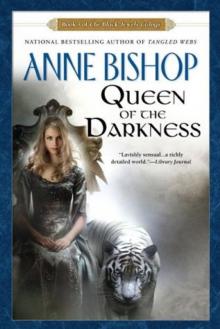 Queen of the Darkness bj-3
Queen of the Darkness bj-3 Belladonna e-2
Belladonna e-2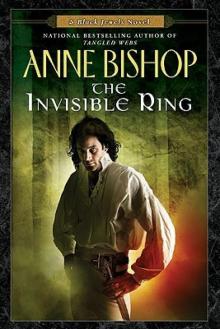 The Invisible Ring bj-4
The Invisible Ring bj-4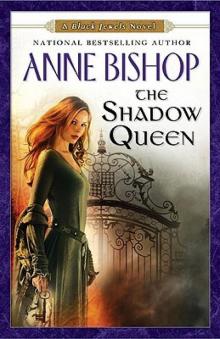 The Shadow Queen bj-7
The Shadow Queen bj-7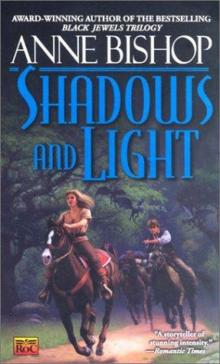 Shadows and Light ta-2
Shadows and Light ta-2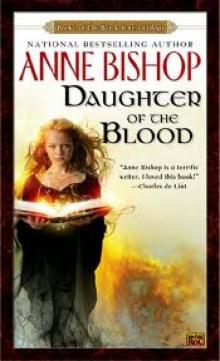 Daughter of the Blood bj-1
Daughter of the Blood bj-1 The Voice: An Ephemera Novella(An eSpecial from Roc)
The Voice: An Ephemera Novella(An eSpecial from Roc)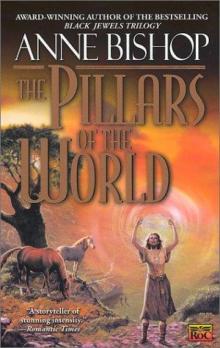 The Pillars of the World ta-1
The Pillars of the World ta-1